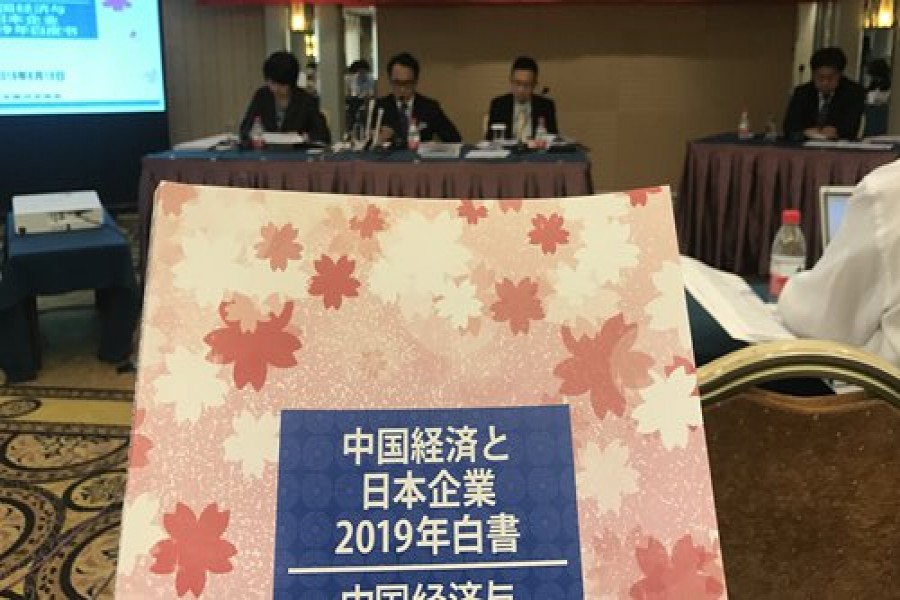Japanese companies firmly believe that China remains one of the top global markets despite the ongoing US-China trade war and other rising risks, and China's further opening-up and efforts to strengthen intellectual property rights (IPR) protection also make the country more attractive to foreign investors, a Japanese annual business report showed on Wednesday.
The trade war between China and US has so far not had a big impact on Japanese companies' direct business in China, Motoo Ono, the president of the Japanese Chamber of Commerce and Industry in China (JCCIC), said at a press briefing in Beijing to release the 2019 white paper on the Chinese economy and Japanese companies.
This is the 10th year the business group published the white paper, which this year is based on responses from 8,756 JCCIC member companies.
"More than 60 percent of Japanese companies source from China, while only 5.9 percent of Japanese companies in China have business involved in exports to the US, so the impact is limited," Ono explained.
But he also noted that some Japanese firms that specialize in US exports or Japanese suppliers of Chinese trading companies may be hurt by the tariff war.
"We do hope that China and the US could reach a trade deal in the near future to settle trade disputes. The Chinese and US economies will not return to the era of the cold war or decouple from one another. Tesla is setting up a factory in Shanghai, and China will probably import US agricultural and energy products. The two countries will continue cooperating with each other," Ono told the Global Times.
Chinese and US leaders are expected to meet during the G20 later this month in Osaka, Japan to exchange views on the development of China-US relations, the Xinhua News Agency reported.
Although Japanese companies also face other issues such as rising labor costs, increasing competition and stricter environmental management in the Chinese market, they believe China is still a world-leading market, Ono said.
About 48.7 percent of Japanese companies plan to expand their business in China in the next one or two years, with 44.8 percent planning to maintain the current operation, the white paper said, citing a report by government body JETRO.
"China's rising consumption power and stable economic growth are making the country an equally important market as the US to Japanese companies, and China is also a critical market for Japan's industrial chain adjustment," Liu Junhong, a research fellow at the China Institutes of Contemporary International Relations, told the Global Times.
With China's manufacturing and consumption upgrade, Japanese companies will scale up efforts in exploring the Chinese market to provide commodities, technology and experience of high quality. Donoue Takeo, a representative of JCCIC, also told the Global Times that some Japanese companies may be interested in participating in China's 5G construction.
The report also highlighted the Chinese government's efforts to improve the business environment, such as the new negative list that reduces restrictions on foreign investors in financing and the auto industry, the lifting of a ban on rice grown in Niigata Prefecture, and IPR laws concerning technology imports.
In 2018, foreign direct investment (FDI) from Japan to China rose 16.5 percent year-on-year to $3.81 billion, the white paper said. That compared with a 3-percent growth rate of global FDI inflows to China during the same period.
The white paper also urges the Chinese government to improve its market mechanisms, deepen reforms of the administrative system and further open up to ensure market fairness.
"We hope the Chinese government could further improve its competition laws and treat Chinese and foreign companies equally. Sectors such as manufacturing, insurance and services could be opened up further," Ono noted, calling on Chinese regulators not to adopt a "one-size-fit-alls" approach in environmental protection.


